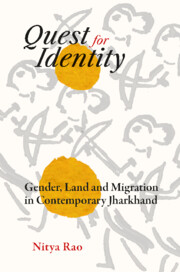2 - Kinship Matters: Women’s Land Claims in the Santal Parganas
Published online by Cambridge University Press: 26 July 2023
Summary
Introduction: Land, Kinship and Identity
This chapter discusses the processes by which kinship relations, particularly patrilineages, are being strengthened amongst the Santal community in a village, called here Chuapara, in Dumka district, Jharkhand (see Figure 2.1). The rise of a democratic state, accepting the notion of equal rights for all citizens, alongside the creation of market institutions (wage labour and land markets, for instance) to meet production requirements, is expected to lead to an erosion of men's base of power in terms of both caste- and kinship-based control over land. However, writings in the field of anthropology have demonstrated the continuing importance of kinship in determining property rights and gendered access to resources, social rights and obligations, and in organising power and authority.2Rather than withering away, social structures of kinship and caste have been re-fashioned, with the upper-caste elite diversifying and dominating non-agricultural assets, not just land. Women, who face disadvantages in terms of education, capital and mobility while continuing to be held responsible for household maintenance, are further marginalised in this diversification process (Epstein, Suryanarayana and Thimmegowda, 1998; Harriss-White and Janakarajan, 2004). Sacks notes that
the other side of that process is that kin corporations were not totally destroyed over-night. Rather they have been and continue to be slowly subverted, transformed, and overcome – only to struggle toward rebirth repeatedly as a defense against ruling-class attacks, as a means of spreading the risks of existence, or as a way of holding one's own against poverty. Women as sisters, mothers, and wives, have been the central actors in these struggles. This history has yet to be written. (1979: 7)
In this chapter, I examine the ways in which kinship relations are being reformulated and their implications for gender in a context where the struggle for a separate state of Jharkhand emphasises not just a class or proletarian identity but also a tribal, or adivasi, identity. There has been considerable debate on the use of different terms when representing the tribes, as these have varying political connotations. Hardiman notes that the term adivasi is preferable in the Indian context – with over 400 such communities representing close to 8 per cent of the total population – as it relates to ‘a particular historical development: that of subjugation’ (1987: 15) by traders, moneylenders and landlords who established themselves under the protection of colonial authorities.
- Type
- Chapter
- Information
- Quest for IdentityGender, Land and Migration in Contemporary Jharkhand, pp. 37 - 65Publisher: Cambridge University PressPrint publication year: 2024



